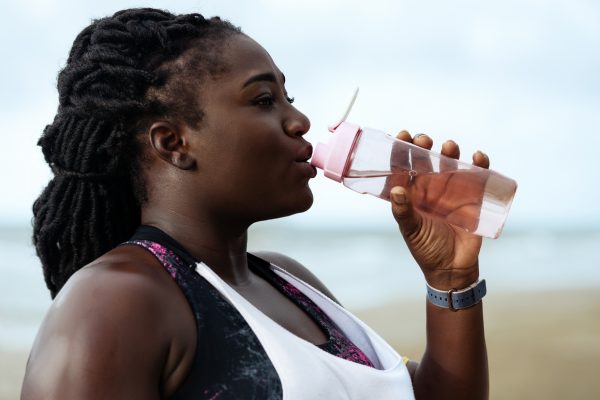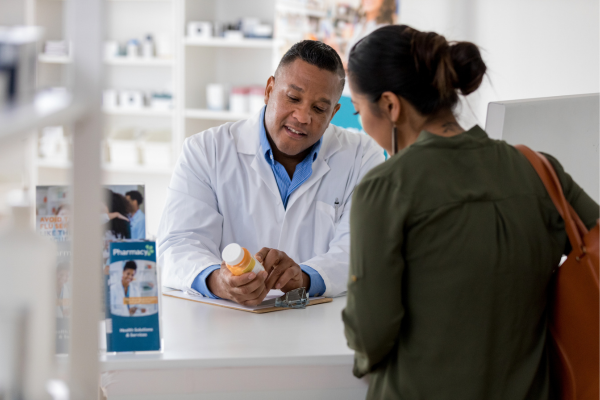March 07, 2024
Learn 6 ways to prevent kidney disease.
Did you know that around 1 in 7 adults in the United States–more than 37 million people–have kidney disease?
Despite its prevalence, many aren't aware they have kidney disease until it’s too late. However, there are steps you can take to safeguard your kidney health.
Here are six tips to get you started.
1. Get regular check-ups
Approximately 90% of people with kidney disease don’t know they have it. Luckily, it is very easy to learn if your kidneys are functioning properly. All you need to do is ask your healthcare professional for these simple tests:
- Urine albumin-creatinine ratio (uACR): Checks the urine for albumin, an important protein, and creatinine, a waste product. Albumin doesn’t belong in the blood while creatinine does. If albumin levels are high or creatinine is low, there may be kidney issues.
- Estimated glomerular filtration rate (eGFR): Uses the amount of creatinine in the blood to estimate kidney function.
Take this one-minute quiz to learn if you are at risk of kidney disease. Bring your results to your healthcare to begin the conversation about your kidney health.
2. Manage your blood sugar
Diabetes is the leading cause of kidney disease in the United States. Around 30% of people diagnosed with Type 1 (juvenile-onset) diabetes and up to 40% of people who have Type 2 diabetes suffer kidney failure at some point in their lives.
Doctors diagnosed Precious McCowan with Type 1 (juvenile-onset) diabetes when she was a child. Her parents were diligent in keeping her healthy as she grew up. Once Precious went to college, her health took a backseat.
"I wanted to focus on studying and having fun. My diabetes was out of control for four years. I came home after graduating, feeling nauseated," said Precious. "I found out my blood sugar was out of control and that I also had high blood pressure and kidney disease."
One year later Precious’ healthcare providers were preparing her for dialysis. Now, she recommends everyone pay attention to their blood sugar level–especially if you have prediabetes or diabetes.
You can manage your blood sugar by:
- Getting regular checkups and following your healthcare provider’s instructions.
- Eating a healthy, well-balanced diet as recommended by your healthcare provider, diabetes educator, or kidney dietitian.
- Learning about kidney-protective medications.
Learn more about diabetes and kidney disease.
3. Control your blood pressure
High blood pressure is the second leading cause of kidney disease. It’s silent and doesn’t often show symptoms until the damage is done.
Even worse, many people with high blood pressure don't know how serious it is. That's what happened to Marlon Condoll Jr.
“I wasn’t given a roadmap when I was first diagnosed with high blood pressure and mild kidney disease. I didn’t make any significant health changes. I did not understand the situation and my kidneys failed,” said Marlon. “I want everyone to know about their blood pressure. They may avoid dialysis by paying attention to it.”
You can manage your high blood pressure by:
- Exercising regularly
- Eating less fat and salt
- Limiting alcohol
You might be living a healthy lifestyle and still have high blood pressure. The only way to know for sure is to have it measured.
Start at your healthcare provider’s office. If they are concerned with the results, they may prescribe medications, encourage lifestyle changes, or encourage you to measure your blood pressure at home.
Learn more about high blood pressure.
4. Eat more plant-based protein
Did you know that eating more plant-based foods can lower your risk of kidney disease? It may sound simple, but it’s true!
Transitioning to a plant-based diet means eating more whole grains, fruits, vegetables, legumes (beans, peas, and lentils), unsalted nuts, and healthy oils. It also means cutting back on animal products like dairy, meat, and poultry.
“Lean into the fiber and nutrient-rich foods from your childhood. What is recognizable, enjoyable, and accessible to you? This could be anything from jicama, plantains, or beans.” Registered Dietitian Maya Feller said, “Eat the rainbow. Berries, nuts, and seeds are fantastic but there are so many more options to choose from like quinoa, millet, teff, and red, black, or wild rice.”
For optimal health on a plant-based diet, steer clear of processed foods that are high in added sugars, saturated fat, and sodium. Indulging in these additives can come at a cost.
- Added sugar: Natural sugars are okay in moderation. Added sugars provide little nutrition and can mess with blood sugar. Over time, this can lead to health problems like diabetes, which can harm your kidneys.
- Saturated fat: Too much saturated fat boosts "bad cholesterol," raising the risk of heart disease, obesity, and kidney issues.
- Sodium: Eating too much salt can raise blood pressure, increasing the chances of hypertension, heart disease, and kidney problems.
Learn more about plant-based diets.
5. Hydrate properly

While you may have heard of the saying ‘8 is great’ in reference to how much you should drink, there is no one-size-fits-all rule to how much water you should drink. Proper hydration depends on factors like your age, climate, and existing health conditions.
What is universal is watching your consumption of sugary drinks and alcohol.
“Everyone’s hydration needs are different but be mindful of sugar-sweetened beverages and alcohol.” Feller said, “These are two things that can impact anyone’s blood sugar and pressure. Speak with a healthcare provider to determine what proper hydration looks like to you.”
6. Be Careful with Pain Medicines (Analgesics)

While over-the-counter pain medicines are easy to obtain and can be helpful, they are not without risk. Using them for a long time or at high doses can harm healthy kidneys. However, kidney disease from pain medicines can often be prevented.
How to safely use analgesics:
- Speak with a healthcare provider about pain or discomfort. Make sure they know about all the medicines you're taking, including over-the-counter ones. Follow their pain management recommendations.
- Read the warning label before using any over-the-counter painkillers.
- Avoid using painkillers with a mix of ingredients like aspirin, acetaminophen, and caffeine in one pill for a long time.
Learn more about over-the-counter painkillers and kidney disease.
This content is provided for informational use only and is not intended as medical advice or as a substitute for the medical advice of a healthcare professional.


















